Related Research Articles
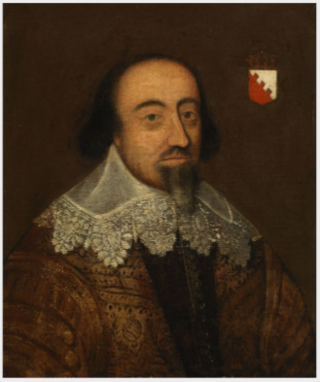
Richard Boyle, 1st Earl of Cork, also known as the Great Earl of Cork, was an English politician who served as Lord Treasurer of the Kingdom of Ireland.
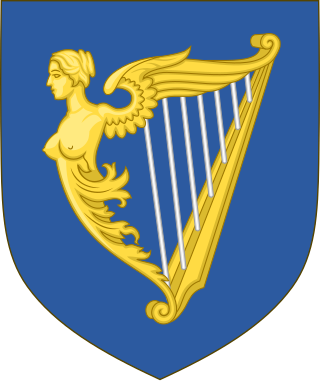
The Irish House of Commons was the lower house of the Parliament of Ireland that existed from 1297 until 1800. The upper house was the House of Lords. The membership of the House of Commons was directly elected, but on a highly restrictive franchise, similar to the unreformed House of Commons in contemporary England and Great Britain. Catholics were disqualified from sitting in the Irish parliament from 1691, even though they comprised the vast majority of the Irish population.

Richard Boyle, 1st Earl of Burlington, 2nd Earl of Cork was an Anglo-Irish nobleman who served as Lord High Treasurer of Ireland and was a Cavalier.
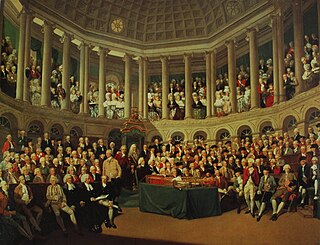
The House of Commons is the name for the elected lower house of the bicameral parliaments of the United Kingdom and Canada. In both of these countries, the Commons holds much more legislative power than the nominally upper house of parliament. The leader of the majority party in the House of Commons by convention becomes the prime minister. Other parliaments have also had a lower house called the "House of Commons".
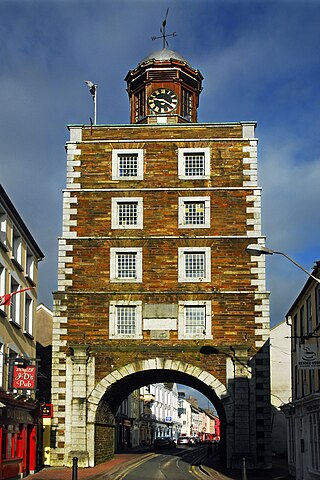
Youghal is a seaside resort town in County Cork, Ireland. Located on the estuary of the River Blackwater, the town is a former military and economic centre. Located on the edge of a steep riverbank, the town has a long and narrow layout. As of the 2022 census, the population was 8,564.

Earl of Kingston is a title in the Peerage of Ireland. It was created in 1768 for Edward King, 1st Viscount Kingston. The Earl holds the subsidiary titles Baron Kingston, of Rockingham in the County of Roscommon, Viscount Kingston, of Kingsborough in the County of Sligo, Baron Erris, of Boyle in the County of Roscommon, and Viscount Lorton, of Boyle in the County of Roscommon, also in the Peerage of Ireland. He is also a baronet in the Baronetage of Ireland. Between 1821 and 1869 the earls also held the title Baron Kingston, of Mitchelstown in the County of Cork, in the Peerage of the United Kingdom.
Cork East is a parliamentary constituency in County Cork represented in Dáil Éireann, the lower house of the Irish parliament or Oireachtas. The constituency elects 4 deputies on the system of proportional representation by means of the single transferable vote (PR-STV).
County Cork was a parliamentary constituency in Ireland, represented in the Parliament of the United Kingdom. From 1801 to 1885 it returned two Members of Parliament (MPs) to the House of Commons of the United Kingdom of Great Britain and Ireland.
Youghal was a United Kingdom Parliament constituency in Ireland returning one MP. It was an original constituency represented in Parliament when the Union of Great Britain and Ireland took effect on 1 January 1801.
Mallow was a United Kingdom Parliament constituency in Ireland, returning one MP. It was an original constituency represented in Parliament when the Union of Great Britain and Ireland took effect on 1 January 1801. The constituency lasted until 1885 when it was absorbed into the North East Cork constituency.
Youghal was a parliamentary borough represented in the Irish House of Commons until its abolition on 1 January 1801. It was a corporation with burgesses and freemen.
Cork North-East was a parliamentary constituency represented in Dáil Éireann, the lower house of the Irish parliament or Oireachtas from 1961 to 1981. The constituency elected 5 deputies to the Dáil until 1969, and then 4 thereafter. The method of election was proportional representation by means of the single transferable vote (PR-STV).
Richard Townesend was a soldier and politician in England. He was born in 1618 or 1619. Much research has been undertaken by various members of the Townsend family to trace Richard's origins but nothing is known about him before 1643 when he was appointed to command a company, as a captain, in Colonel Ceely's Regiment, which had been raised to garrison Lyme Regis. Richard was engaged in several skirmishes, most notably on 3 March 1643 when he surprised and routed 150 Royalist cavalry at Bridport. Later, he was present during the defence of Lyme Regis 20 April – 13 June 1644 where he distinguished himself and was promoted to Major. In 1645 he assumed command of Colonel Ceely's Regt when Colonel Ceely was returned to Parliament as Member of Parliament (MP) for Bridport.

Henry Boyle, 3rd Earl of Shannon, KP, PC (Ire), styled Viscount Boyle from 1764 until 1807, was an Anglo-Irish politician and peer who was one of the last surviving members of the Parliament of Ireland. He represented County Cork in the Parliament of the United Kingdom from 1801 to 1807. He then briefly served as Member of Parliament for Bandon in 1807, succeeding as Earl of Shannon later in the same year. He served as Custos rotulorum for County Cork from 1807 to his death. He was the first Lord Lieutenant of Cork from 1831 to his death.
Carysfort was a borough constituency for Carysfort, now Macreddin, in County Wicklow represented in the Irish House of Commons until its abolition on 1 January 1801.
There have been two baronetcies created for persons with the surname Tynte, one in the Baronetage of England and one in the Baronetage of Ireland. Both are extinct.
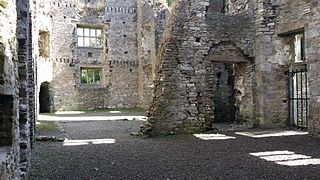
Sir (Charles) Denham Orlando Jephson-Norreys, 1st Baronet DL, known as Denham Jephson until 1838, was an Anglo-Irish landowner and Whig politician.
Anthony Jephson was an Irish soldier, landowner and Whig Member of Parliament.